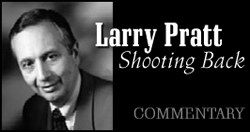Other Pratt Articles:
The Power to
Tax is The Power to
Destroy
POWER TENDS TO CORRUPT - EVEN OUR FOUNDERS
By Larry Pratt
March 29, 2006
NewsWithViews.com
Most conservatives tend to put the founders on a pedestal.
Based on what they wrote -- both in the Constitution and in their public statements -- much of that honor is deserved. What is surprising is how quickly the Founders themselves forgot their own words when in power.
Lord Acton is famous for his maxim that "Power tends to corrupt and absolute power corrupts absolutely." We can be glad that the founders designed a government that made it hard to get absolute power. But some of the most eloquent defenders of limited government forgot all the talk when they had a chance to do the walk.
The biggest and earliest offender seems to have been Alexander Hamilton, the author of several of the essays in the Federalist Papers which argued for ratification of the new Constitution (in 1787).
In Federalist 48, Hamilton argued that, regarding freedom of the press, no powers had been given to the new government to restrain it. "For why declare that things shall not be done which there is no power to do? Why for instance, should it be said that liberty of the press shall not be restrained, when no power is given by which restrictions may be imposed?"
But the same Alexander Hamilton in 1798 (about a decade after writing the above words) supported the Sedition Act which made it a crime to criticize a federal official. Indeed, newspaper editors were clapped in jail for having had the temerity to question President John Adams.
Critics were alarmed at the claims of the Federalists, including Hamilton, that the Constitution had implied powers which let the new government do just about anything that Congress had a majority vote to support. A crisis demanded unanimity in the minds of the Federalists, and the danger they perceived from the French Revolution was seen as an immediate crisis.
When Virginia and Kentucky enacted resolutions of nullification of the Sedition Act (and its companion Alien Act), the Federalists proclaimed that only the Supreme Court could overturn an act of Congress. This was an entirely different view from that expressed by the Federalist writer Alexander Hamilton who had even justified using state militias to restrain federal tyranny!
The Alien and Sedition laws were subject to intense debate because of the initiatives of Virginia and Kentucky. The debate led to John Adams being a one-term president and the election of his arch-enemy, Thomas Jefferson. Did the Federalists see the tyrannical potential of their Sedition law? Probably so, since it had been set to expire just before Thomas Jefferson took office. What was okay in the hands of the Federalists was not going to be handed to their enemies -- the Republicans led by Jefferson.
The New England states all decried the Virginia and Kentucky legislatures' resolutions of nullification. But when the War of 1812 began, they strenuously objected to the war on the grounds that their trade with England and their livelihood were going down the drain. When attacks on the British in Canada were attempted, these states withdrew their militias from federal control. To many in Virginia and Kentucky, it seemed that the northern states were now supporting nullification!
What a difference a few years made when the tables had been turned! For that matter, states such as Virginia and Kentucky were among the biggest supporters of the War of 1812 and their citizens tended to think of the New Englanders as treasonous for withdrawing their militias from the war. Of course, they forgot that they had been viewed as traitors in 1798 when they tried to nullify the Alien and Sedition Acts.
It is striking how many of our current debates over what powers are authorized by the Constitution are but echoes of the heated arguments that fill the annals of our early Republic. The founders themselves had as much trouble restraining their own greed for power as we do today.
|
Subscribe to the NewsWithViews Daily News Alerts! |
I seldom quote anything from France with approval, but they do have an excellent saying: "The more it changes, the more it stays the same."
These events
have been masterfully recorded in book by William Watkins entitled
Reclaiming the American Revolution: The Kentucky and Virginia
Resolutions and Their Legacy. I had the privilege of interviewing
Watkins on my radio show, Live Fire, which is archived on the
Gun Owners of America web site at http://www.gunowners.org/radio.htm.
� 2006 Larry Pratt - All Rights Reserved
Sign Up For Free E-Mail Alerts
E-Mails are used strictly for NWVs alerts, not for sale
Larry Pratt has been Executive Director of Gun Owners of America for 27 years. GOA is a national membership organization of 300,000 Americans dedicated to promoting their second amendment freedom to keep and bear arms.
GOA lobbies for the pro-gun position in Washington and is involved in firearm issues in the states. GOA's work includes providing legal assistance to those involved in lawsuits with the Bureau of Alcohol, Tobacco and Firearms, the federal firearms law enforcement agency.
Pratt has appeared on numerous national radio and TV programs such as NBC's Today Show, CBS' Good Morning America, CNN's Crossfire and Larry King Live, Fox's Hannity & Colmes, MSNBC's Phil Donahue show and many others. He has debated Congressmen James Traficant, Jr. (D-OH), Charles Rangel (D-NY), Rep. Carolyn McCarthy (D-NY), Senator Frank Lautenberg (D-NJ), and Vice President Al Gore, among others. His columns have appeared in newspapers across the country.
He published a book, Armed People Victorious, in 1990 and was editor of a book, Safeguarding Liberty: The Constitution & Militias, 1995. His latest book, On the Firing Line: Essays in the Defense of Liberty was published in 2001.
Pratt has held elective office in the state legislature of Virginia, serving in the House of Delegates. Pratt directs a number of other public interest organizations and serves as the Vice-Chairman of the American Institute for Cancer Research.
The GOA web site is: gunowners.org. Pratt's weekly talk show Live Fire is archived there at: www.gunowners.org/radio.htm
E-Mail: ldpratt@gunowners.org
Either Pratt or
another GOA spokesman is available for press interviews.
The New England states all decried the Virginia and Kentucky legislatures' resolutions of nullification. But when the War of 1812 began, they strenuously objected to the war on the grounds that their trade with England and their livelihood were going down the drain.











